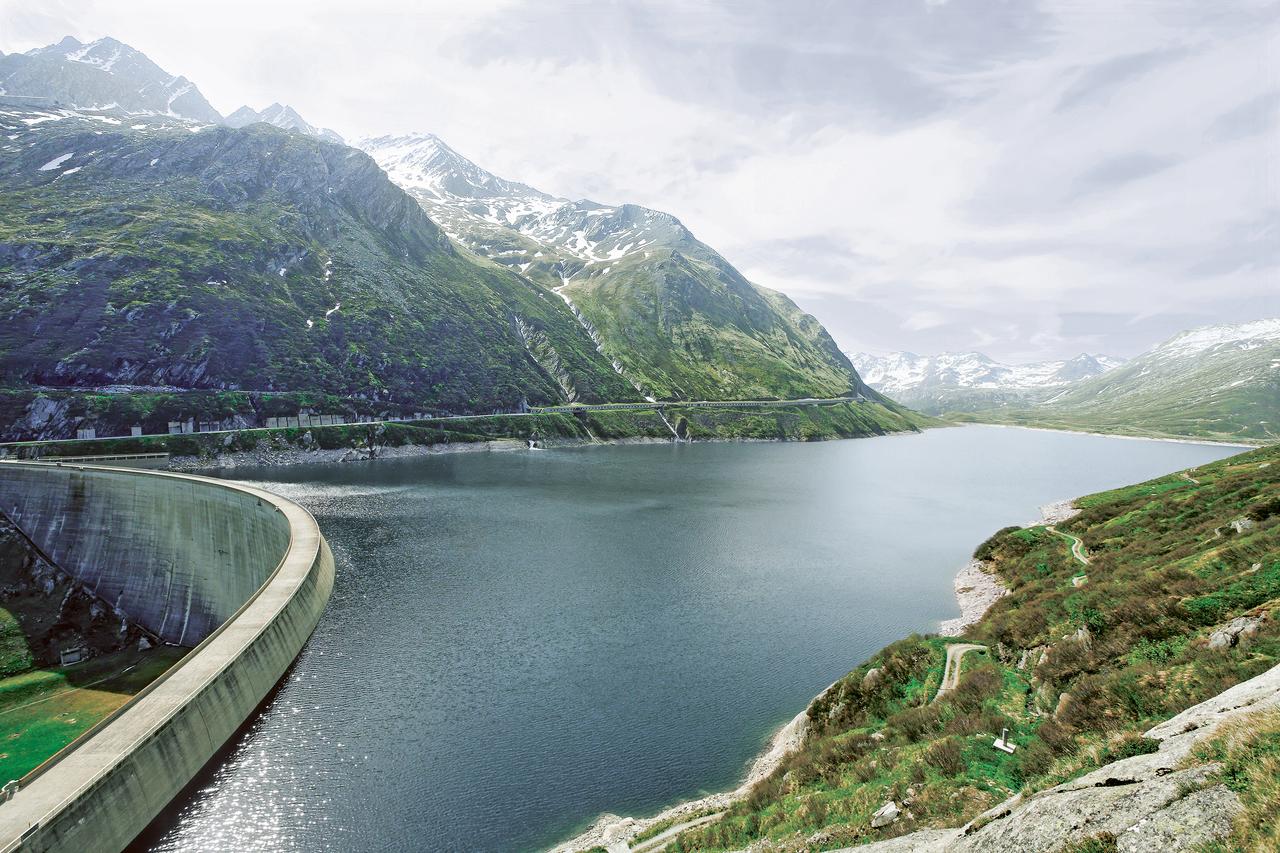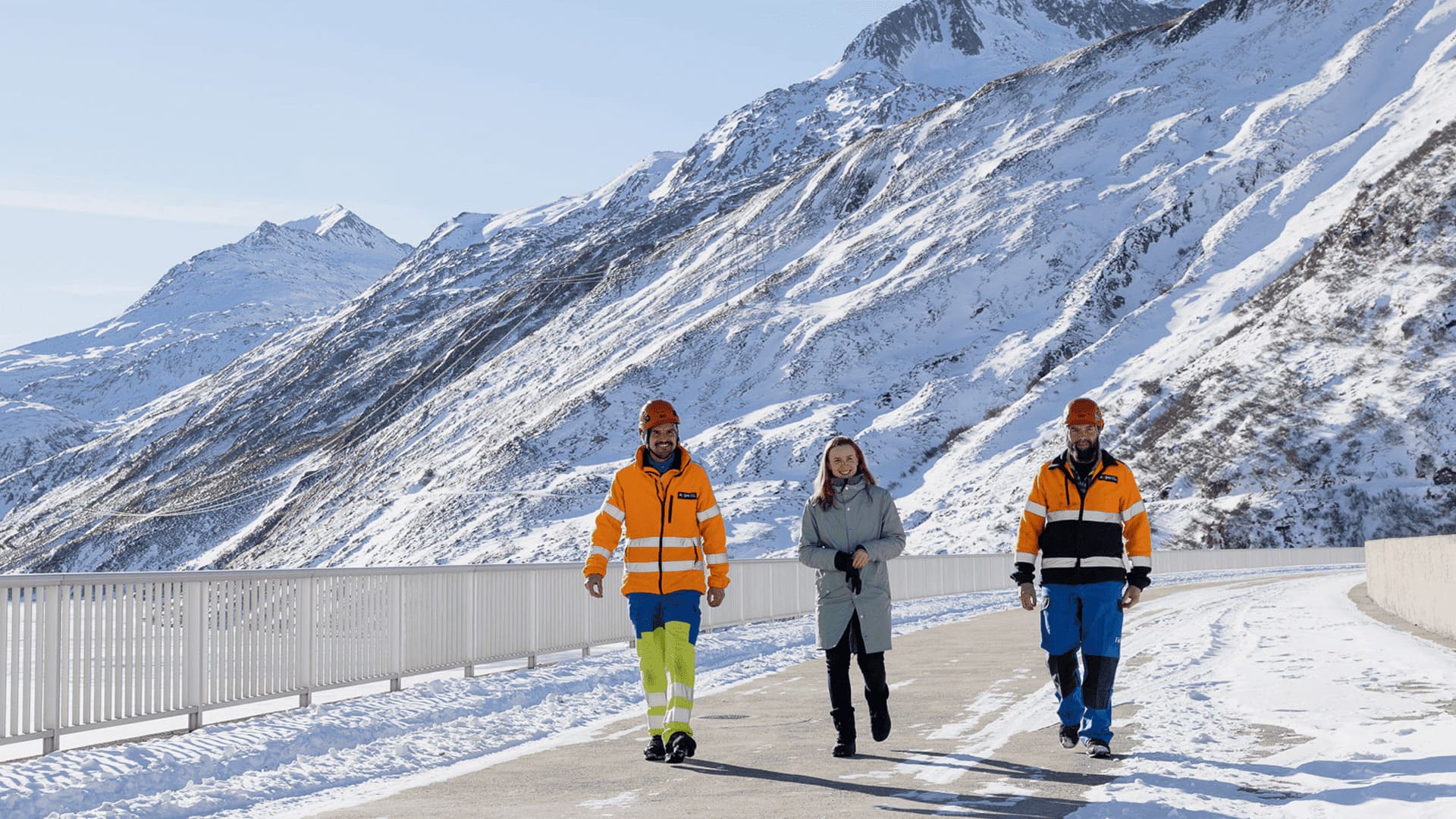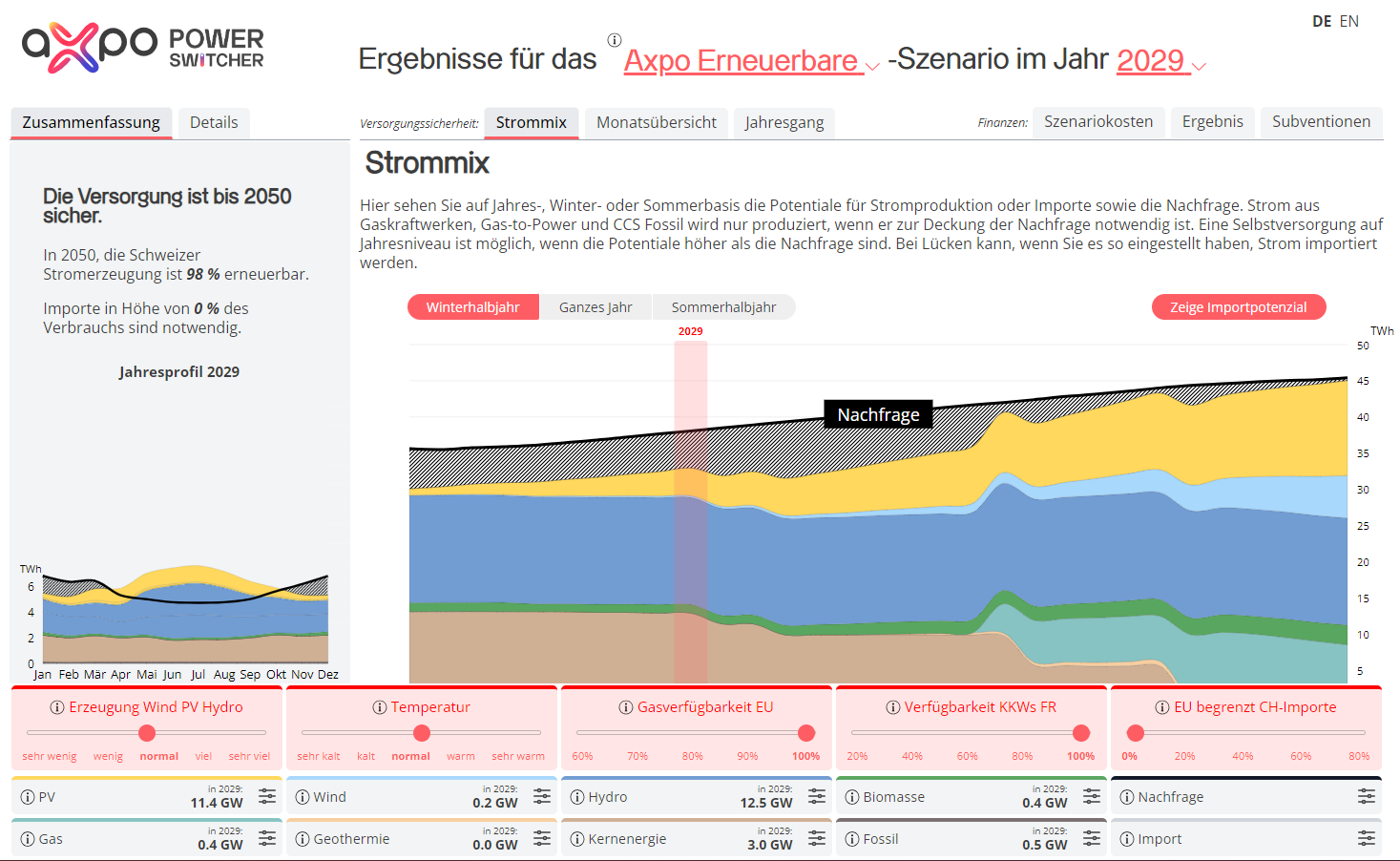

Wind Power For plenty of winter electricity
Recent advances in wind turbine technology have changed the rules of the game in Switzerland. In the past, a wind speed of around 7 metres per second was required to generate wind energy. Today, 5 metres per second is enough to produce sufficient wind power. This development has created the opportunity to make more use of wind energy in Switzerland.
Here are ten reasons why Axpo supports this expansion:
-
Strong in winter
wind accounts for two-thirds of total energy production during the winter, making it an ideal addition to the Swiss electricity mix.
-
Great potential
Axpo estimates the usable potential of wind power in Switzerland to be 10 terawatt hours (TWh), of which around 5.9 TWh would be in winter, although from a technical perspective the potential would be significantly greater.
-
Local & renewable
wind energy is a local and renewable resource that reduces our energy dependence on other countries and generates added value regionally.
-
CO2-free
wind energy is CO2-free and has a positive carbon footprint.
-
Creates planning security
as a wind turbine will run for around 25 years, the local electricity it generates can give security in financial planning.
-
Proven and dependable
tried and tested many thousands of times, technologically advanced for reliable energy production.
-
Space saving
wind turbines require little space during construction and operation.
-
Environmentally friendly
wind energy is environmentally friendly and subject to strict environmental regulations.
-
Efficient energy balance
Wind turbines generate 45 times more energy over their lifetime than is required for their production.
-
Dismantle and recycle
wind turbines can be completely disassembled and recycled, which further increases their sustainability.
Nevertheless, the path to a sustainable energy supply is not without its challenges. The acceptance of wind power projects often depends on the support of local communities. Axpo is committed to transparency and dialogue to ensure that the benefits of these projects are visible and tangible to all.
Axpo plans
Axpo aims to drive forward the expansion of wind energy throughout Switzerland and is examining various locations for this purpose. In doing so, we are committed to constructive dialogue with local partners, including communities and landowners. With more than 30 years of experience in the development of wind power through our Volkswind subsidiary, we are experts in the planning, construction and operation of wind power plants.
Since summer 2013, Axpo and our Swiss energy services subsidiary CKW have been operating a wind turbine with a gross output of 2.3 MW on the Lutersarni hillside in Entlebuch, Central Switzerland. At 120 metres, it is roughly the same height as the Prime Tower in Zurich and produces 2.85 million kWh of electricity a year. That is an impressive 20 per cent more than the expected production volume, meaning the plant can cover the annual consumption of around 630 average Swiss four-person households.
Another wind project, on the Swiss Plateau north of the Alps, is already well advanced. Located on the Lindenberg hill, at the border between the cantons of Aargau and Lucerne, it is being realised jointly by CKW and local utilities AEW Energie and SIG.
Further wind farm projects are being planned by Axpo in Central Switzerland and Aargau. We are also examining the potential feasibility of wind farms in various other Swiss municipalities. Our aim is to progress the expansion of wind power in Switzerland step by step.
Political considerations
The political starting point for the development of wind power plants in Switzerland is the complex planning process at cantonal level. This was mandated by the Energy Strategy 2050 and the revised Energy Act. The process requires cantons to follow a number of phases, from the identification of areas with wind power potential to public consultation and parliamentary approval. The implementation status varies from canton to canton.
At federal level, three pieces of proposed legislation are relevant:
The Electricity Act, which increases the expansion targets and introduces new funding instruments
The acceleration bill, which aims to shorten authorisation procedures.
The Windexpress, which offers easier authorisation for advanced projects.
The Swiss Parliament has recognised the potential of wind energy and wants to create favourable conditions for its development through the corresponding bills. All these measures are intended to drive forward the expansion of wind energy in Switzerland and accelerate the currently lengthy authorisation processes. Strict environmental compatibility requirements remain in place.
Integration into the landscape
At a time when climate change is becoming increasingly evident and the urgency to switch to renewable energies is growing exponentially, it is imperative that we have the courage to change. This change affects not only our sources of energy but the world in which we live. The development of renewable infrastructure such as wind turbines and solar farms brings significant changes to the landscape and frequently stimulates discussions about the protection and preservation of our natural environment.
It is important that we have these discussions. We need the courage to be open to new ideas and new approaches. The transformation of the landscape through renewable infrastructure is already a reality. It illustrates the need to act and shows the opportunities we have to shape a sustainable future. By using modern technologies and a sensitive planning process, we can ensure that landscape change is in harmony with ecological and aesthetic concerns.
The courage to create a new landscape requires an open dialogue between communities, decision-makers and the wider population. It is vitally important that all voices are heard and that the solutions we find together take into account both the needs of society and concerns for environmental protection.
Ultimately, the courage to embrace that new landscape is a sign of our commitment to a sustainable future. By accepting changes and actively working to shape them in a positive way, we can create an environment worth living in for future generations. Renewable energy, especially wind, is part of that modern landscape: an energy landscape for the Switzerland of tomorrow.
White Paper: Wind energy - an underestimated potential
Switzerland is still barely exploiting its wind potential - yet up to 10 terawatt hours of wind power could contribute to a secure, renewable energy supply in the future. Our new white paper shows why wind energy (especially in winter) should be a central component in the energy mix of the future.
Find out more about the role and potential of wind energy in Switzerland in our white paper.
- White Paper “Wind energy in Switzerland: its role and potential" View Send email Download
Wind energy from A-Z
Wind power has many different facets. Here’s a quick overview on a few important keywords – but first let’s provide a close up look from an unusual perspective.

Wind energy keywords
Rated output is the capacity of the wind turbine generator at full capacity measured in megawatt (MW). Wind turbines reach the rated output value at various wind speeds.
Onshore wind turbines are located on land and generate wind energy from mainland wind.
Offshore wind turbines benefit from the high wind speed at sea. They are located off coastal areas. Axpo holds interests in 80 turbines with a total capacity of 400 MW in the North Sea.
The site defines a coherent area suitable for the use of wind energy. The site offers space for at least 3 wind turbines.
Wind energy plant refers to the wind power plant or the wind turbine. The facility transforms the power of wind into electrical energy and feeds it into the power grid.
A wind power plant comprises the following elements:
- Rotor blades: The rotor blades of a wind power plant convert the kinetic energy of air particles into rotation energy. Most wind energy rotors have three blades.
- Rotor: The rotor relays the rotation energy to a generator that transforms it into electricity.
- Nacelle: The nacelle houses the hub, the brake gear, and the generator.
- Tower: The tower supports the mass of the nacelle and the rotor blades and must withstand the enormous static load coming from the wind.
- Foundation: The tower is erected on a foundation. In order to ensure the stability of a wind energy plant, different constructions are sometimes required depending on the conditions of the underground.
The wind farm is an arrangement of three or more wind turbines at one location.
Contact
Are you a landowner and would like to make a contribution to Switzerland's energy transition? Or are you an SME and are looking for more planning security for electricity prices? Get in touch with us.
We will gladly take care of your request!




.jpg)





